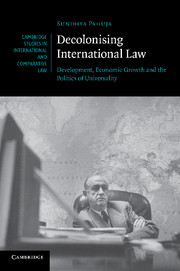Book contents
- Frontmatter
- Contents
- Acknowledgements
- 1 Introduction
- 2 Inaugurating a new rationality
- 3 From decolonisation to developmental nation state
- 4 From permanent sovereignty to investor protection
- 5 Development and the rule of (international) law
- 6 Conclusion
- Appendix One A note on the use of ‘Third World’
- Appendix Two Harry Truman – Inaugural Address
- Bibliography
- Index
- cambridge studies in international and comparative law
3 - From decolonisation to developmental nation state
Published online by Cambridge University Press: 07 October 2011
- Frontmatter
- Contents
- Acknowledgements
- 1 Introduction
- 2 Inaugurating a new rationality
- 3 From decolonisation to developmental nation state
- 4 From permanent sovereignty to investor protection
- 5 Development and the rule of (international) law
- 6 Conclusion
- Appendix One A note on the use of ‘Third World’
- Appendix Two Harry Truman – Inaugural Address
- Bibliography
- Index
- cambridge studies in international and comparative law
Summary
Introduction
During the formation of the key institutions of contemporary international law in the mid-twentieth century much of the world was still under colonial rule. Even after the end of the Second World War, it was not evident to Britain and France that decolonisation was necessarily to come at all, let alone at the speed at which it was ultimately to happen. Within eighteen months of the end of the Second World War the Cold War had begun, and despite its dislike of overt imperialism, the United States considered it to be in its strategic interests to support elements of the French and British empires if that were necessary to prevent communism and/or the expansion of China or the Soviet Union.
Notwithstanding the strategic imperatives of the ‘Great Powers’, however, anti-colonial resistance was on the increase, and agitation for independence was spreading. The struggle was happening on a number of fronts. Colonial people mobilised for independence, sometimes turning to arms, in Asia, Africa and the Middle East. In addition, as time wore on, the Cold War’s relationship to decolonisation became increasingly ambiguous, for whilst the United States had initially tempered its anti-imperial stance for reasons of Cold War strategy, by the end of the 1950s it was perceived by many, including Harold Macmillan, then prime minister of Britain, that East–West rivalry over the Third World could have an enormous impact on the outcome of what was looking increasingly like an inevitability. Indeed, even by 1957 ‘it was understood [by the Great Powers] that independence for co-operative nationalists was the best chance of saving Africa from communist subversion.’
- Type
- Chapter
- Information
- Decolonising International LawDevelopment, Economic Growth and the Politics of Universality, pp. 44 - 94Publisher: Cambridge University PressPrint publication year: 2011

